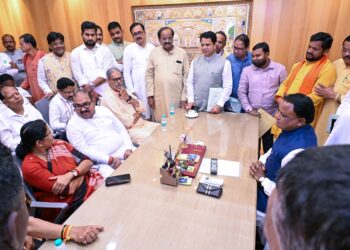The Comptroller and Auditor General of India (CAG) has revealed significant financial irregularities, suspected misappropriation, and alarming lapses in the implementation of key welfare and development programs in Odisha.
These explosive findings were presented yesterday in the Odisha Legislative Assembly and later shared with the media by the office of the Principal Accountant General (Audit-I).
₹148.75 Crore Suspected Misappropriation in Tribal Welfare Projects
A compliance audit of the Integrated Tribal Development Agencies (ITDAs) uncovered glaring misuse of public funds. Engineers tasked with executing projects were found to have personal bank accounts through which ₹148.75 crore of project funds were diverted. The audit detected personal transactions, including ATM withdrawals, UPI transfers, mobile recharges, and even insurance premium payments from these accounts, raising strong suspicions of misappropriation.
Further scrutiny revealed ₹3.38 crore of excess expenditure without supporting vouchers, and payments of ₹3.23 crore made without invoices. Alarmingly, invoices worth ₹22.78 crore contained irregularities such as missing dates, duplicate numbers, or were from unregistered entities. In a blatant violation, the ITDA in Paralakhemundi procured musical instruments and costumes valued at ₹3.74 crore against an approved budget of only ₹73.60 lakh—an excess of more than five times the sanctioned amount.
Unsafe Water Supply and Ineffective Projects
The audit of Odisha’s urban water supply schemes under AMRUT and BASUDHA disclosed that, despite spending ₹2,808.27 crore, many projects remain incomplete, leaving large areas of the state with ongoing drinking water issues. Water supplied in several towns was found to fall well short of the mandated 135 liters per person per day. Testing revealed that 16 water quality parameters—including E. coli and turbidity—exceeded permissible limits. A ₹9.79 crore renovated water treatment plant in Burla was discovered supplying turbid water after new systems mixed with sludge from an old clarifier.
Adding to the mismanagement, solar-powered water projects worth ₹1.74 crore, installed in Berhampur in 2020, were found defunct within three years due to a lack of maintenance.
Special Schools for Disabled Children Operating Under Distress
Auditors identified that 35% of NGO-run special schools for children with disabilities were operating without the mandatory registration. Many of these institutions lacked basic facilities, including classrooms, hygienic toilets, safe drinking water, and hostels. Shortages of essential teaching aids, such as braille books and hearing aids, ranged from 30% to 72%.
Significant Wastage in Higher Education Projects
The CAG report also highlighted substantial wastage in higher education initiatives under the Rashtriya Uchchatar Shiksha Abhiyan (RUSA). Of the six Model Degree Colleges constructed at a cost of over ₹40 crore, five were abandoned and converted into skill centres due to poor site selection, while the sixth was repurposed for highway construction. Additionally, an ₹11.30 crore project for a Cluster University in Berhampur failed due to governance disputes. Utkal University was also found distributing laptops and desktops worth ₹1.83 crore, meant for a central ICT lab, among its staff instead.
Other Concerning Findings
- Rubber plantations worth ₹19.64 crore under ITDA Kaptipada failed due to suspected fund misappropriation and inadequate planning.
- The Cuttack Development Authority incurred a loss of ₹6.44 crore by failing to enforce lease conditions.
- The Information & Public Relations Department overspent ₹12.11 crore on TV advertisements by ignoring prescribed government rates.
- Revenue authorities caused an estimated loss of ₹83.88 crore to the state by incorrectly levying stamp duty and registration fees.
- Erroneous land valuation in the Puri district resulted in excess compensation payments of ₹16.68 crore.
These revelations illustrate a troubling picture of systemic failures and financial mismanagement across multiple departments, raising serious questions about accountability in the state’s governance.





























